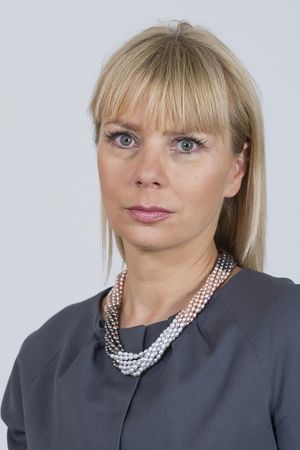Elżbieta Bieńkowska
(politician) | |||||||||||||||||||
|---|---|---|---|---|---|---|---|---|---|---|---|---|---|---|---|---|---|---|---|
 | |||||||||||||||||||
| Born | 4 February 1964 Katowice, Poland | ||||||||||||||||||
| Alma mater | Jagiellonian University, Warsaw School of Economics | ||||||||||||||||||
| Children | 3 | ||||||||||||||||||
| Spouse | Artur Bieńkowski | ||||||||||||||||||
| Party | Civic Platform | ||||||||||||||||||
Chairing the European Commission's High-level Group of Personalities on Defence Research
| |||||||||||||||||||
Elżbieta Ewa Bieńkowska is a Polish politician who was Poland's Deputy Prime Minister and Minister of Regional Development and Transport before being nominated as European Commissioner by Jean-Claude Juncker in 2014.[1]
Bieńkowska was Minister of Regional Development in Prime Minister Donald Tusk's Cabinet from 16 November 2007 until 27 November 2013,[2] when she was appointed Deputy Prime Minister of Poland while continuing her previous responsibilities at the Ministry of Infrastructure and Development.
Education
Bieńkowska graduated from Jagiellonian University with a Master's degree in Oriental Philology in 1989.[2] She has also received a post-graduate Diploma from the Polish National School of Public Administration and afterwards a postgraduate studies MBA from SGH Warsaw School of Economics.[2]
Professional career
Bieńkowska's career in public administration started at Katowice City Council where she worked on regional contracts being promoted, in 1999, as head of Katowice's Department for Economy. Later that year, she was appointed Director of Regional Development for the Silesian Voivodeship, where she served until 2007.
Career in politics
Bieńkowska describes herself as a technocrat.[3] She is not a party member, and was elected to the Senate of Poland in 2011 as an independent candidate, backed by the Civic Platform.[4]
In the government of Prime Minister Donald Tusk, Bieńkowska was Minister for Infrastructure and Development for Poland, as well as Deputy Prime Minister from the end of 2013 until the end of September 2014. In this capacity, she was charge of allocating European Union funding and the country's transport infrastructure.[5] Under her leadership, the ministry was Poland's second-largest department after the ministry of finance, with 1,600 employees and nine deputy ministers.[4] In February 2013, she secured €105.8 billion from the EU budget for 2014-20.[4]
On 3 September 2014, Bieńkowska was announced as the Polish nominee to the European Commission, in place of foreign affairs minister Radek Sikorski, who had been put forward in August in a bid to secure the post of High Representative of the Union for Foreign Affairs and Security Policy.[6]
On 10 September 2014, Juncker designated Bieńkowska as European Commissioner for Internal Market, Industry, Entrepreneurship and SMEs, following which, on 1 November 2014, she took office in the Juncker Commission.
Since 2015, Bieńkowska has been chairing the European Commission's High-level Group of Personalities on Defence Research.[7]
References
- ↑ https://www.premier.gov.pl/en/news/news/candidates-for-ministers-bios.html
- ↑ a b c https://web.archive.org/web/20091118061640/http://www.mrr.gov.pl/english/management/management/Strony/E_Bienkowska_CV_en.aspx
- ↑ http://platforma.org/aktualnosc/18257/e-bienkowska-jestem-technokratka%7c
- ↑ a b c Annabelle Chapman (January 15, 2014), Elżbieta Bieńkowska – Hidden asset European Voice.
- ↑ Marcin Sobczyk (February 13, 2014), Poland Sacks Roads Agency Head The Wall Street Journal.
- ↑ Cynthia Kroet (September 3, 2014), Poland nominates Bieńkowska as Commission candidate European Voice.
- ↑ Simon Taylor (March 30, 2015), High-level group of personalities on defence research European Voice.
Wikipedia is not affiliated with Wikispooks. Original page source here